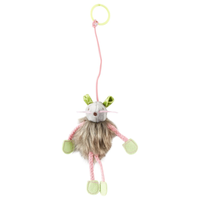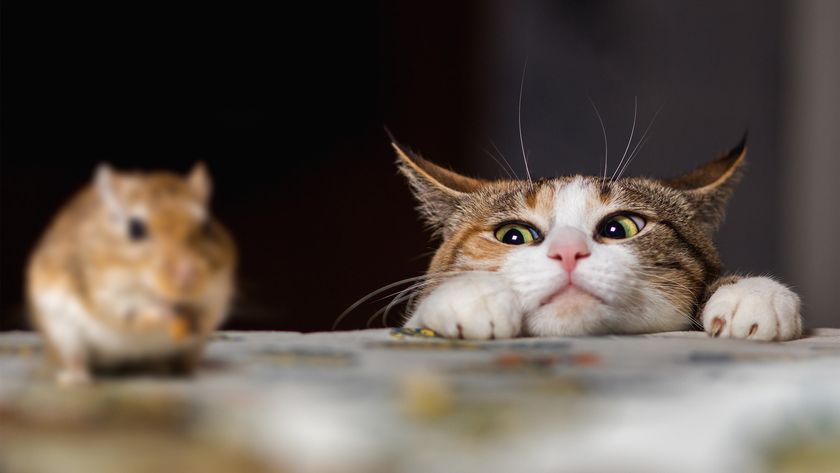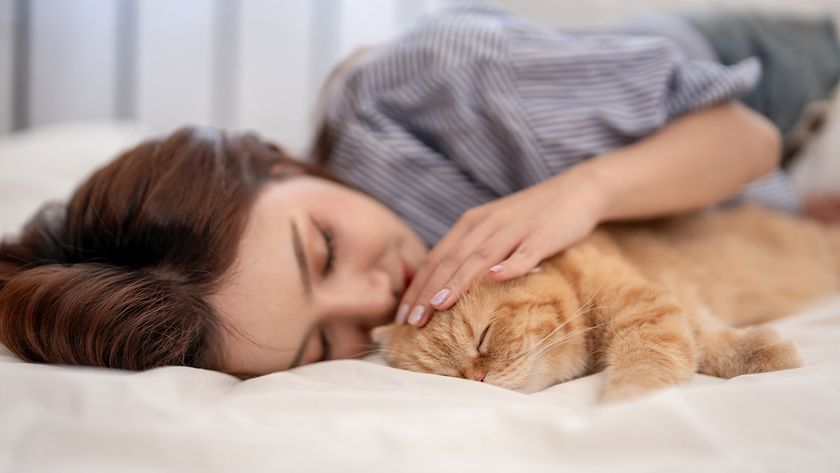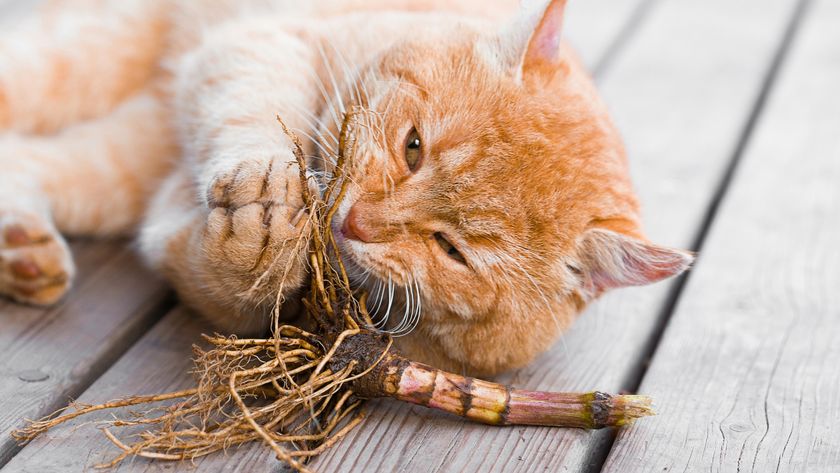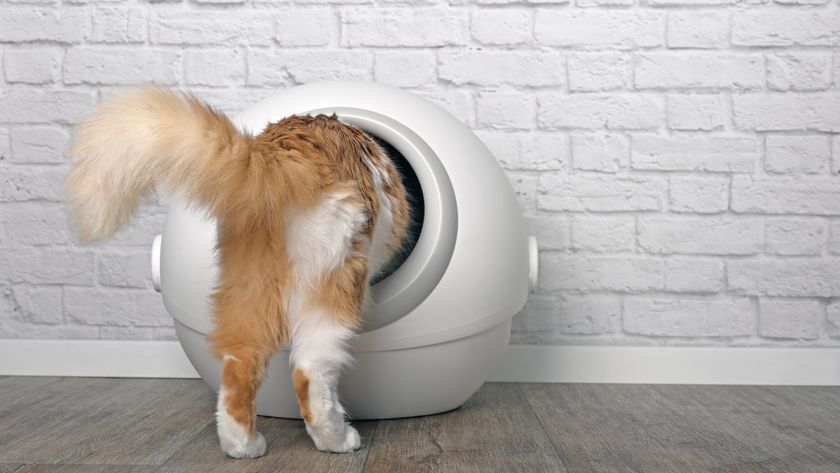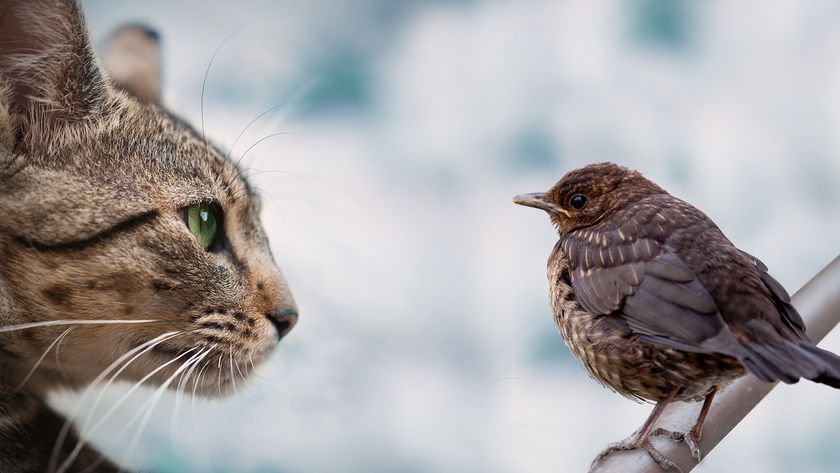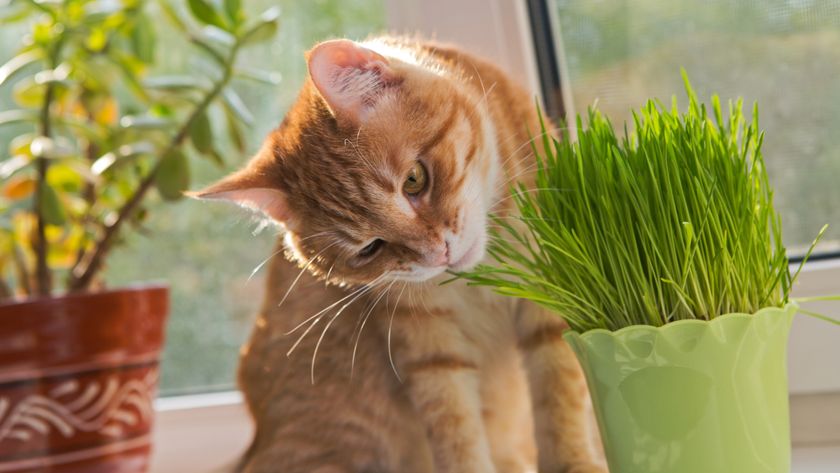Why does my cat bite me? A vet explains 8 common reasons (plus how to stop them)
Wondering, ‘Why does my cat bite me?’ Our vet has the answers!
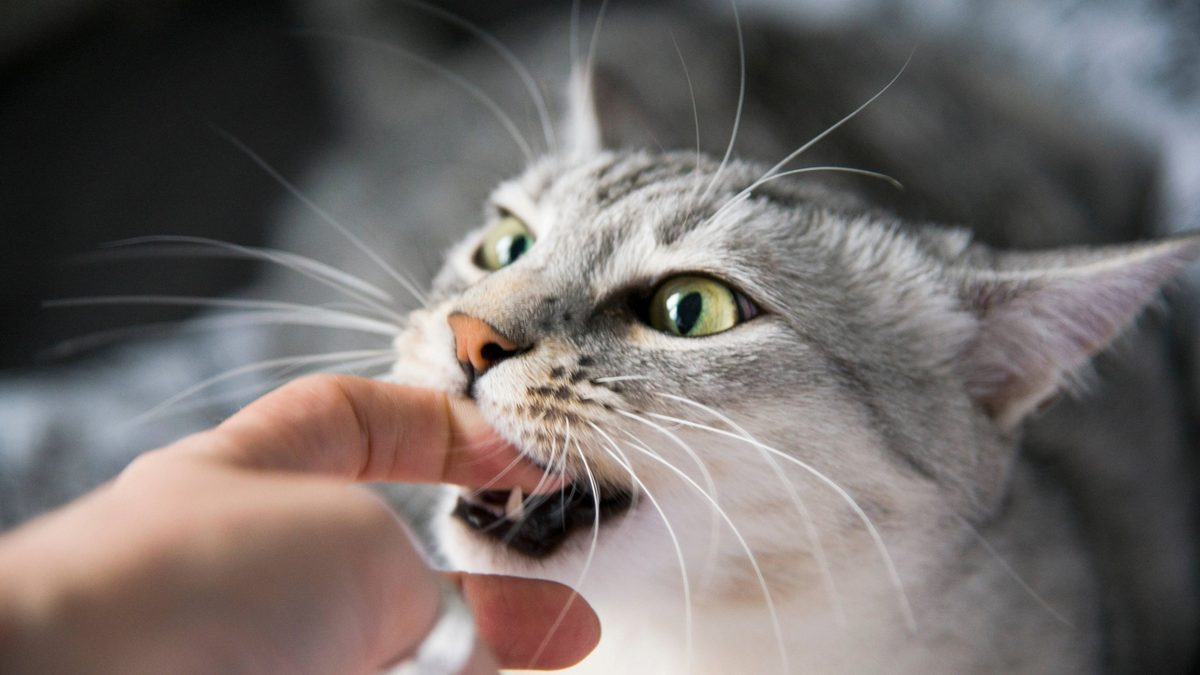
Why does my cat bite me? This might come as a surprise, but cat biting isn’t always due to aggression. Whether they’re giving you a ‘love bite’ or practicing their hunting skills, there are lots of potential reasons behind this unwanted behavior. Or, if you have a kitten, they might be going through the teething process and might benefit from one of the best kitten teething toys.
Sometimes this behavior can feel a little bit out of the blue – one moment you’re enjoying a petting session, and the next minute, their claws and teeth are buried deep into your skin. This is one of the most common cat behavior problems, and if you’re looking to get to the bottom of it, it all starts with understanding your cat’s body language.
To help you work it out, we’ve asked expert vet Dr. Hannah Godfrey to explain all of the reasons why your cat might bite you. Below, she’s explained the causes, signs of aggressive behavior, whether cat bites are dangerous—and most importantly, how to stop them from doing it!
Is it normal for cats to bite their owners?
While this probably isn't the news you wanted to hear, it's definitely not uncommon for cats to bite their owners - but that doesn't mean they're doing it to try to hurt you.
Although cat biting may seem like an act of aggression, it's important to remember that cats are natural-born predators, so behaviors like scratching, biting, pouncing, and stalking are all hardwired into their DNA.
You definitely don't want to discourage their natural instincts because biting is one way they communicate information, but if they're play biting you and you don't like it, redirect them toward the best cat toys and reward them with the best cat treats when they bite these instead of you to reinforce the positive behavior.
Dr. Godfrey says: "Just because it’s normal doesn’t mean that by owning a cat you’re setting yourself up to get bitten regularly. Thankfully, it’s not their only form of communication, so if you really tune in to what your cat might be trying to tell you, you’re unlikely to get bitten.
"By biting you, your cat is letting you know how they are feeling – perhaps they’re in pain, they want some space, they’re feeling unwell, or they want you to stop what you’re doing. Equally, cats don’t just bite because of negative emotions, they may also bite because they’re really wound up from playing and get a bit carried away."
Why does my cat bite me?
Here are eight of the most common reasons your cat is biting you...
1. Petting in the wrong place
Have you ever been lovingly stroking your feline friend (who seemed to be enjoying it) only to have them whip round and suddenly give you a nip for what seems like no reason? Your first thought was probably 'Hey! What did I do to deserve that?' but rest assured, your cat doesn't suddenly hate you. They are usually just letting you know they've had enough of all the attention for now.
To avoid these friendly nips, it's worth watching your cat's body language during petting play. Signs they may have had enough include their tail starting to twitch or their ears moving to the side.
Dr. Godfrey says: "Cats can be sensitive in certain areas and don’t necessarily like to be touched there. Every cat is different, but many don’t enjoy being petted on their tails, tummy, or paws."
2. Dislike of petting
Not all cats like being petted, so it's important to know where your kitty falls on the stroking scale - can they not get enough of it, or do they prefer just the occasional bit of affection?
Use your cat's body language to decide if they are ready for a petting session before you start if you want to avoid those warning nips.
Overall, this kind of cat bite is usually nothing to worry about, however, if their reaction to grooming changes suddenly and they are now always warning you off stroking them in a place where they liked being groomed before, this could signal that your cat has injured itself or there is something else wrong.
Of course, cats are famously fickly so it may signify nothing, but if it persists, and is accompanied by hissing or growling, a trip to the vets may be in order.
Dr. Godfrey says: "Not every cat enjoys a fuss – some don’t enjoy petting at all and show affection in other ways, perhaps by sitting nearby or on your lap or rubbing against your legs. If your cat regularly bites or shows other signs of being upset when you pet them, it’s likely they don’t enjoy being touched."
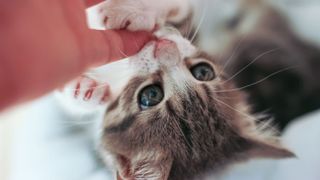
3. Love bites
Love bites are notoriously popular amongst cats and when you think about it, it's actually quite sweet – it's something they do with each other as a sign of affection and acceptance, so they're letting you know that they consider you part of their fur family. That being said, while it may be called a love bite, it can feel anything but loving when you're on the other end of it!
To help discourage this, when it happens, let out a small cry and move away from them. This will help them understand that their love bites aren't being received in the way they were intended.
Kittens use squeals and other high-pitched noises to indicate when play is too rough and their mother will also do the same to let them know if they're getting out of hand, so this should help your kitty understand that you don't like this behavior.
Dr. Godfrey says: "Being bitten by your cat isn’t always a telling-off, it could be a sign of affection. If your cat nibbles your ears or gives you little love bites when they rub against your face, this is a sign of affection."
Here are some other ways to know if your cat loves you.
4. Cat bites when grooming
Cats also show affection by grooming those they are closest to. They use their rough tongues to clean you in a most delightful - if sandpapery - way, but during this cleaning process they can also nip and bite you. This isn't aggressive behavior, it's just part of their natural cleaning process – if they can't remove stubborn matts of hair or dirt they resort to biting it out.
Some argue your cat is biting you because they've perceived something on your skin they can't remove with their tongues, although others believe it's just them showing you love during the grooming process (as in point 2). Either way, to help stop them doing this let out a small 'ow' and move away, this should help discourage them from doing it again.
Dr. Godfrey says: "If your cat bites you when you’re grooming them, it could be that they’re painful or finding it uncomfortable. If it’s one place in particular and they’re not usually sensitive, it’s a good idea to ask your vet to check them over. However, trying a different type of brush and trying not to turn grooming into a game might help too."
Here are our top tips for brushing cats.
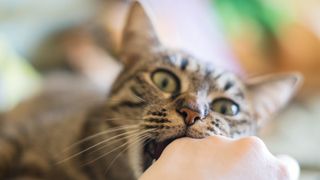
5. Honing their hunting skills
Cats, especially young cats, have a need to play to practice and maintain their hunting skills. Cats are innate predators, so they need to find an outlet for this behavior. This is especially common with indoor cats – as they are denied access to the stalking grounds full of prey that they would have in the wild, so they look for alternative things to hunt – namely you!
The easy way to ween them off this is to provide them with cat toys to use instead. The best interactive cat toys are a great way to get your kitty to stop attacking you and also get them healthier and more stimulated. To learn about cat play biting, have a read of this feature.
Again, you should also make it clear that biting and scratching is a no-no from an early age.
As before, a medium volume high-pitched 'Ow' and moving away from them will help them get the message. You should also use toys that move or cat wands to attract their attention away from you, then reward this behavior with treats – simulating the reward they would get after eating a kill.
Dr. Godfrey says: "Cats love to hunt, and if they’re a little bored or haven’t had the opportunity to practice hunting recently, they might have to improvise by stalking you!"
SmartyKat Bouncy Mouse Teaser Toy
Looking for a way to redirect your cat's hunting instincts? A teaser toy is the way to go! Your cat will have loads of fun chasing the plush mouse at the end of the string, and we love how interactive it is. Our tester says this toy is durable, excellent value for money and a great way to spend quality time with your cat.
6. Teething pain
Kitten teething tends to start around nine weeks of age and can carry on for several months. As a way to ease the enormous discomfort they often feel during this time, cats will chew on anything they can get their paws on - including you!
Again, this is a great opportunity to teach them that your toes and fingers aren't for them to munch on by giving them the option of the best kitten teething toys instead – particularly those made of cloth, as they represent an alternative. You could also try keeping your fingers away from their mouth when stroking them.
Dr. Godfrey says: "If your kitten bites or nibbles you a lot, it could be that it’s because their gums are sore from teething. A kitten’s baby teeth are replaced by adult teeth at around four to six months old."
Catstages Dental Kitty Chew Wheel Cat Chew Toy
This kitten toy is made from non-toxic materials and features a durable rubber ring, perfect for digging their teeth into. The spokes also help massage your cat’s sore gums while exercising their jaw.
7. Depression
Believe it or not, our feline friends can suffer from depression in much the same way we humans can - and they can also detect it in their owners. In fact, one study published in PLOS ONE suggests that when a cat detects that its owner is depressed, it can cause that cat to begin to act aggressively.
Using 1.3 million medical records over a 10-year period, the University of Rennes in France found that more than 41 per cent of those who had gone to hospital with a cat bite were also treated for depression at some point.
The link is not clear cut, however, and it is more likely that the biting behavior was due to changes in the way their owners behaved, such as reduced responsiveness – depressed individuals often make less eye contact compared to those without depression. The data is also slightly skewed, as many depressed people are advised to get a pet to help them feel calmer, so are far more likely to own a cat.
Dr. Godfrey says: "A cat who is bored or depressed might bite because they’re lacking mental stimulation or physical activity and are looking for some fun or interaction with you."
8. Fear
Cats can get scared when there is a change in routine or living conditions. Cats are not keen on change and can feel threatened or want to escape. If they are prevented from doing so, they can attack. Fearful cats cause the most damage, so when introducing a new person or animal to your home, or planning a major refurbishment, it's important to watch your cat for changes in its behavior.
If you notice them getting more defensive your first thought may be to comfort them to calm them down, but if they are feeling threatened when you approach, you may be doing more harm than good. Wait for your cat to come to you, and leave treats out for them to help them understand the new situation is not a cause for alarm.
Dr. Godfrey says: "Cats sometimes lash out when they’re scared, especially if they feel under threat and want to protect themselves."
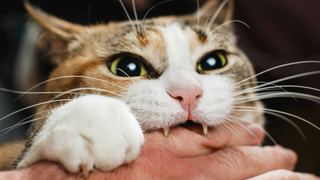
Why does my cat bite me when I sleep?
Cats are nocturnal or crepuscular by nature, which means they're most active at dawn and dusk. But once darkness falls and before light starts to creep in again, our feline friends are prone to boredom - after all, there's only so much grooming you can do and they tend to prefer to nap in the day as opposed to at night.
One way to try to put a stop to this unwelcome behavior is to leave out one of the best automated cat toys or an interactive option that your kitty can amuse themselves with until it's time for you to get up.
Dr Godfrey says: "If your cat tries to wake you up by biting you, they’re probably bored or want your attention. Equally, if you’re a restless sleeper and are moving under the covers, they might try to attack your feet, especially if they often get the zoomies while you sleep. After all, cats are most active at dusk and dawn."
Why does my cat bite me when I pet her?
Petting-induced aggression is something that scientists are still trying to understand but there are several reasons why your cat may suddenly bite you after seemingly enjoying being stroked.
The first is that they're communicating to you that you've reached their sensitivity threshold and they're now feeling overstimulated. Repetitive petting can also create little shocks along your cat's skin and this static electricity can make continued stroking uncomfortable.
Other forms of pain can also play a role in a cat biting while being petted. If your cat has an injury, is suffering from arthritis or is simply not feeling well, being stroked may feel more painful than pleasant.
Why does my cat bite me when I walk by?
As a cat owner, it's highly likely you've wandered past your feline friend with your mind elsewhere only to be jolted out of your thoughts by your furkid suddenly deciding to bite your ankle.
While it may be that you've taken them by surprise and a good bite is their way of letting you know, it's more likely a bid for attention or a signal that they're in a mischievous mood and wanting to play.
Dr. Godfrey says: "Cats are predators, so hunting behaviors are instinctive. If your cat is wound up and ready to practice their hunting skills but they’re stuck inside the house, they’re likely to stalk anything that moves, including your feet!"
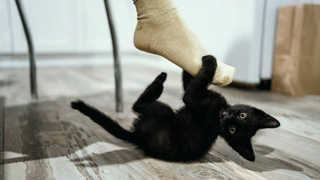
Are cat bites dangerous?
If you're regularly asking, 'why does my cat bite me?' you should consider this. Aggressive cats don't hit the headlines as much as aggressive dogs, mainly because they can do a lot less damage, but that doesn't mean cat bites should be taken lightly.
A study by researchers at the Mayo Clinic found that of 193 patients who came in for cat bites on their hands over a three-year period, 30% had to be hospitalized for an average of 3.2 days, usually due to infection. To prevent this, immediately sterilize any cat bite that breaks the skin and visit a doctor if there are signs of persistent swelling.
The reason cat bites can become infected is due to the anatomy and physiology of cats' teeth. The enamel part of the tooth has tiny vertical grooves on its surface, within these grooves are bacteria. When your (or any) cat bites you or another cat, this bacteria is
then transferred from the tooth surface and into your (or another cat’s) skin. Hence the subsequent infection or abscess.
This underlines the importance of training your cat from a young age that biting isn't tolerated. It's never too late to start, and if you learn the signs of when your cat wants to be left alone and when they are ready to play, both aggressive and playful biting will soon be a thing of the past.

Signs of aggressive behavior in cats
In addition to biting, further signs of aggressive behavior you might see from your cat can include:
- Dilated pupils
- Ears flattened backward on their head
- Tail held erect with hairs raised
- Arched back
How to stop a cat from biting
1. Consider medical causes
Cat aggression can be down to medical causes, especially likely if there has been a sudden change in their behavior.
Conditions like toxoplasmosis, hyperthyroidism, epilepsy, abscesses, arthritis, dental disease, rabies, trauma, and sensory decline or cognitive dysfunction in older cats can all cause your kitty to feel under attack, and so more likely to defend themselves at the slightest provocation. The first thing to do is to visit the vet to check that nothing is wrong.
2. Keep a distance
Cats usually only get aggressive if they feel threatened – usually because they are guarding their territories, defending their offspring, or they feel they need to protect themselves from attack.
If your cat gets a clean bill of health, then try to understand why your moggy feels the need to attack. Aggressive behavior signals that your cat feels trapped, and can't escape from what is threatening them.
A simple way to fix this is to keep away from your furry friend (as hard as that can be) until they come to you of their own accord – then they can't mistake your friendly overtures for threatening behavior.
Aggression caused by territorial behavior is usually triggered by change. Introducing a new cat, a cat in the household becoming sexually mature, or stray cats getting into their personal space can all cause them to go on the defensive. They also react to major disruptions in their living space – a house redecoration or a new person moving in can also make them uncomfortable enough to attack.
Again, leave them alone so they have the time to adapt to the new situation. Threatened cats aren't interested in being petted or played with, they need space to come to terms with the new situation.
3. Don't approach an agitated cat
Another trigger linked to territory is redirected aggression. The cat attacks you because they can't get at what they really want to attack. This can be caused by something as simple as a dog walking past the window. This isn't malicious, it's just a reflex caused by the fight or flight reflex we get too.
These attacks usually happen when you surprise them – they do not go looking for something to attack. This is why it's not a good idea to try to break up fighting cats or suddenly approach them when they are agitated. Read their body language, and if they are looking riled, leave them alone.
Dr. Godfrey adds: "To prevent them from biting you, watch their body language and look out for earlier signs that they might bite. Although it might seem like your cat bites you out of the blue, they usually give plenty of warnings if you’re looking for them."
4. Seek a behavioral expert
Persistent cat aggression not caused by a medical condition means it's time to call in the professionals. A Certified Applied Animal Behaviorist can help you develop a plan to reduce aggression and guide you through its implementation. The ASPCA can help you find a certified trainer.
You might also want to read: How to be a good cat owner and How to discipline a cat.
PetsRadar Newsletter
Get the best advice, tips and top tech for your beloved Pets

Megan is a Staff Writer at PetsRadar, covering features, reviews, deals, and buying guides. She has a wealth of experience caring for animals, having grown up with dogs, cats, horses, guinea pigs, and more throughout her life. She studied BA Journalism at the University of Westminster, where she specialized in lifestyle journalism and was editor of Smoke Radio’s lifestyle website. Megan works alongside qualified vets and accredited trainers to ensure you get the best advice possible. She is passionate about finding accurate and helpful answers to your pet-related questions.
- Kathryn WilliamsFreelance writer
